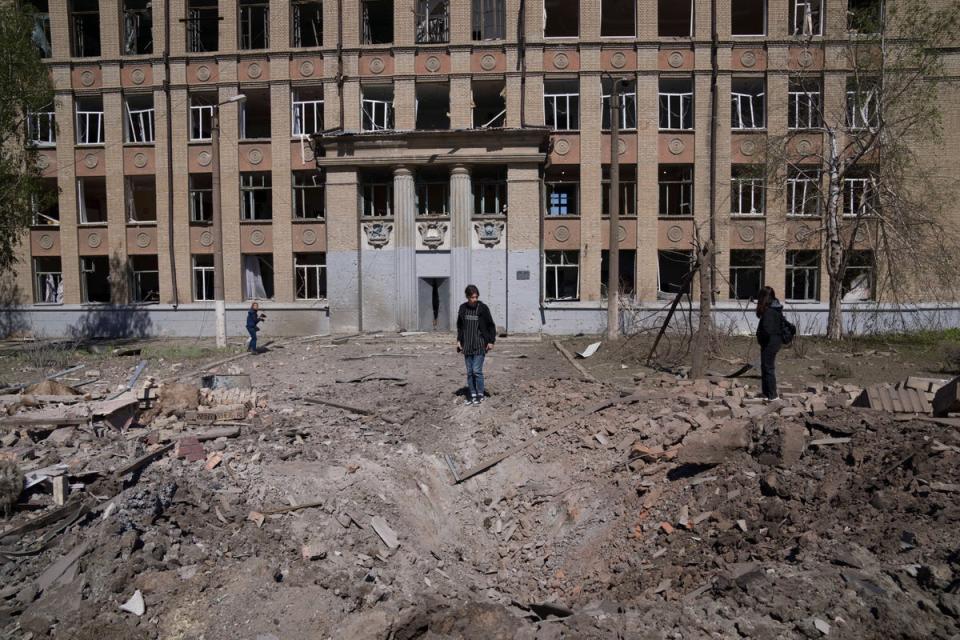Ukraine in ‘fast-track’ talks with allies for fighter jets and missiles
Ukraine and its Western allies are engaged in “fast-track” talks over the supply of long-range missiles and military jets, a top aide to President Volodymyr Zelensky has said.
Mykhailo Podolyak said Ukraine’s allies “understand how the war is developing” and the need to supply planes capable of providing cover for the tanks which have been pledged this week.
He continued: “We must speak reasonably and tell them [allies], for example, ‘This and this will reduce fatalities, this will reduce the burden on infrastructure. This will reduce security threats to the European continent, this will keep the war localised’.”
Mr Podolyak added that Ukraine needs supplies of long-range missiles “to drastically curtail the key tool of the Russian army”, aimed at destroying the storage facilities where it keeps and maintains artillery used on the front line.
However, EU and Nato member Hungary has criticised the further supply of armaments, with Prime Minister Viktor Orban saying countries providing weapons to assist Ukraine in its war with Russia have “drifted” into becoming active participants in the conflict.
Mr Orban has previously refused to send weapons to neighbouring Ukraine and sought to block EU funds earmarked for military aid.
The Ukrainian Foreign Ministry said it would summon Hungary’s ambassador to complain about the remarks. A ministry spokesperson said Mr Orban told reporters that Ukraine was “a no-man’s land” and compared it to Afghanistan.
“Such statements are completely unacceptable. Budapest continues on its course to deliberately destroy Ukrainian-Hungarian relations,” ministry spokesperson, Oleg Nikolenko, said in a Facebook post.

Russia has responded to the coordinated supply of tanks with attacks across Ukraine in recent days. The attacks continued throughout Saturday, with Russian missiles striking the city of Kostyantynivka in eastern Ukraine’s Donetsk province.
The missiles hit a residential area, killing three civilians, wounding 14 and damaging buildings, regional governor Pavlo Kyrylenko said.
Mr Kyrylenko said in a Telegram post: “Kostyantynivka is a city relatively far from the front line, but still, it constantly suffers from enemy attacks. Everyone who remains in the city exposes themselves to mortal danger.
“The Russians target civilians because they are not able to fight the Ukrainian army.”
Russian rockets also hit a residential area in the Donetsk town of Chasiv Yar on Friday night, killing two people and wounding five more.
The Donetsk province has become the epicentre for conflict as Russian forces attempt to restart a halted offensive to capture the city of Bakhmut.
Russian forces are continuing ground attacks around Bakhmut and Avdiivka, another Donetsk city to the south, while Ukraine’s troops were on the offensive in southern and northeast Ukraine, the Ukrainian military said in its daily update on Saturday.
Russia claimed on Saturday that Ukrainian troops had struck a hospital in a Russian-held area of eastern Ukraine.
The alleged strike hit a hospital in Novoaidar, using a US-supplied HIMARS rocket launch system. The Russian defence ministry said the attack was a war crime which killed 14 people and wounded 24 patients and medical staff.
There was no initial response to the allegations from Ukrainian officials.

Meanwhile, the UK Ministry of Defence (MoD) has claimed that top Russian officials are lying about the true death toll in the attack on a Russian troop accommodation in Makiivka on New Year’s Day.
Mr Putin’s commanders had claimed only 89 of its soldiers were killed in the attack, but UK intelligence disputed the Russian death toll, saying in an update on Saturday more than 300 were probably killed.
On the spread of disinformation surrounding the death toll, the MoD said: “This typically comes about through a combination of deliberate lying authorised by senior leaders, and the communication of inaccurate reports by more junior officials, keen to downplay their failings in Russia’s ‘blame and sack’ culture.”

 Yahoo Lifestyle
Yahoo Lifestyle 
